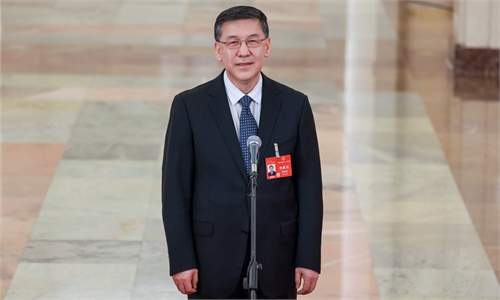
People wear smart glasses to experience the virtual world at the 2023 Global Digital Economy Conference in Beijing, on July 4, 2023. Photo: VCG
A three-year plan was released on Wednesday to foster talent to drive the growth of its digital economy. The initiative aims to enhance support for digital talent through various programs and policy reinforcements, showing the country's latest effort in advancing its digital economic sector.
The Ministry of Human Resources and Social Security revealed on Wednesday that it had launched a three-year action plan to accelerate the cultivation of digital expertise to support the digital economy. The plan focuses on the needs of the digital industry and relevant industries, aiming to increase the supply of skilled digital professionals from 2024 to 2026.
Experts noted that the document could serve as a critical part of China's ongoing efforts to stimulate its digital economy by cultivating high-level talent.
Cultivating talent is essential for developing relevant industries. There is a strong demand for professionals with digital skills across emerging industries, including artificial intelligence and data security, Fu Liang, a Beijing-based tech analyst, told the Global Times on Wednesday.
In 2023, the core industries of the digital economy generated about 12 trillion yuan ($1.66 trillion) in production, accounting for about 10 percent of China's GDP, Sheng Laiyun, a deputy head of the National Bureau of Statistics, told a press conference on Tuesday.
The digital economy is an important part of the new quality productive forces, and Chinese government is accelerating the digitization of traditional industries as well as the development of new digital industries, Sheng stated.
The new policy outlines six key projects, including digital technology engineer training, digital skills enhancement and international exchanges for digital talent.
It also proposes comprehensive policy support in six areas, ranging from improving training policies and evaluation systems to enhancing investment and incentives.
Traditional sectors like media and retail are undergoing digital transformations, hence there is a substantial demand for professionals with digital literacy, Xiang Ligang, director-general of the Beijing-based Information Consumption Alliance, told the Global Times on Wednesday.
It is important to have digital professionals for traditional industries, as they could significantly aid in the economic transformation and upgrading of these sectors, Xiang added, calling for a broad approach to digital literacy beyond just cutting-edge fields.
The document also noted plans to strengthen digital-related academic programs in higher education. Several Chinese universities, including Shanghai University of Finance and Economics and Nanjing University of Finance and Economics, have launched related specialties.
On Saturday, the Renmin University of China established a new department of digital economy, a move described by Zhang Donggang, chairperson of the university council, as a major response to China's directives on digital economic development and modernization, according to the university's official website.



